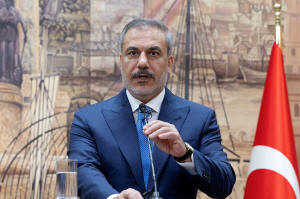|
EU candidate Turkey's ties with the bloc have been rocky in
recent years. Its bid to join the EU has long been frozen due to
EU concerns over its record on human rights and differences over
regional policies, namely in the eastern Mediterranean and over
the ethnically-split island of Cyprus. However, the bloc depends
on NATO member Turkey's help, particularly on migration.
During tensions between EU-member Greece and Turkey in 2019,
Brussels threatened sanctions against Ankara and cut off certain
dialogue channels. Ties have improved since 2021 with high-level
talks restarting.
Turkish Foreign Ministry Spokesperson Oncu Keceli said Fidan had
been invited to attend the meeting on Aug. 29, which Ankara
hoped would form the basis to overcome the "deadlock" from 2019,
adding it showed the EU recognised the need to improve ties too.
"We welcome this invitation. We evaluate it as a search for
dialogue from the EU," Keceli said, adding that cooperation and
dialogue with the bloc must be on a "continuous and systematic"
basis and strengthened in a "sustainable and predictable" way to
improve ties.
He added the bloc's positive approach should not be limited to
such meetings, saying Ankara expected "concrete steps" on the
issues of its accession, visa liberalisation for Turks, talks to
modernise a customs union with the EU, and on deepening dialogue
on economic, political, transportation, and energy matters.
Turkey has good ties with Hungary, which took over the EU's
rotating presidency on July 1, and has previously said it hopes
Budapest's presidency will yield progress on these issues.
(Reporting by Tuvan Gumrukcu; Editing by Jonathan Spicer and
Toby Chopra)
[© 2024 Thomson Reuters. All
rights reserved.]
Copyright 2022 Reuters. All rights reserved. This material may
not be published, broadcast, rewritten or redistributed.
Thompson Reuters is solely responsible for this content.

|
|




